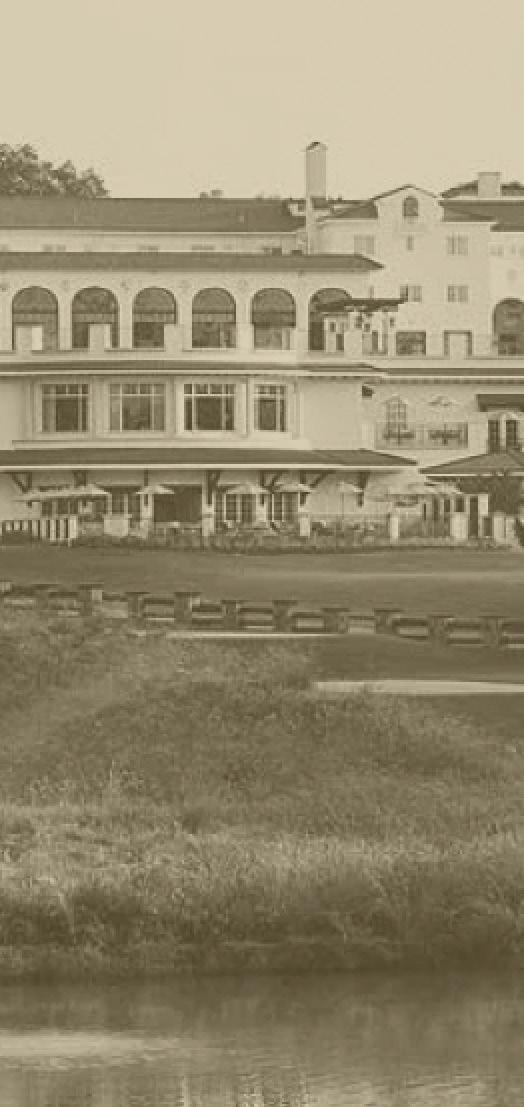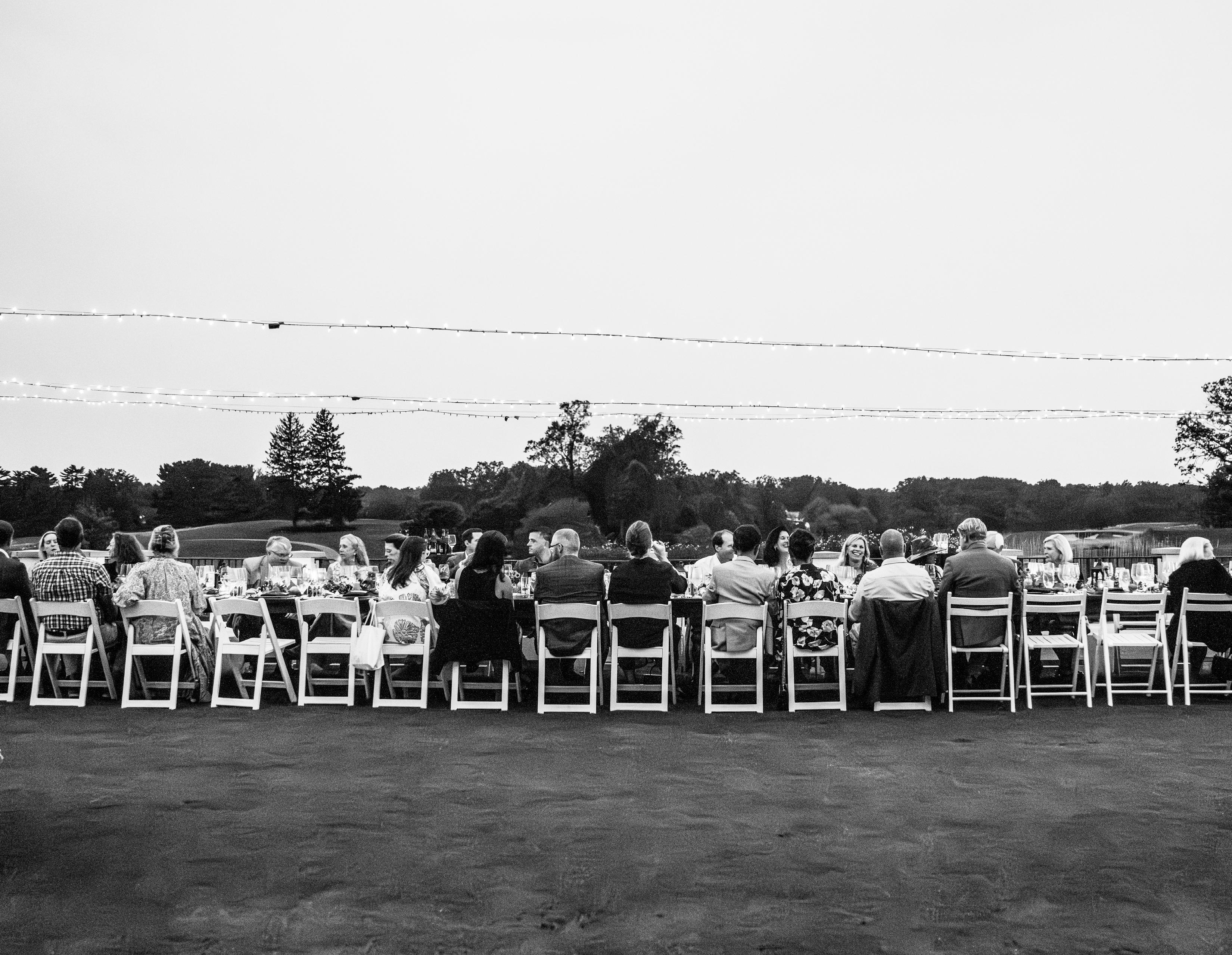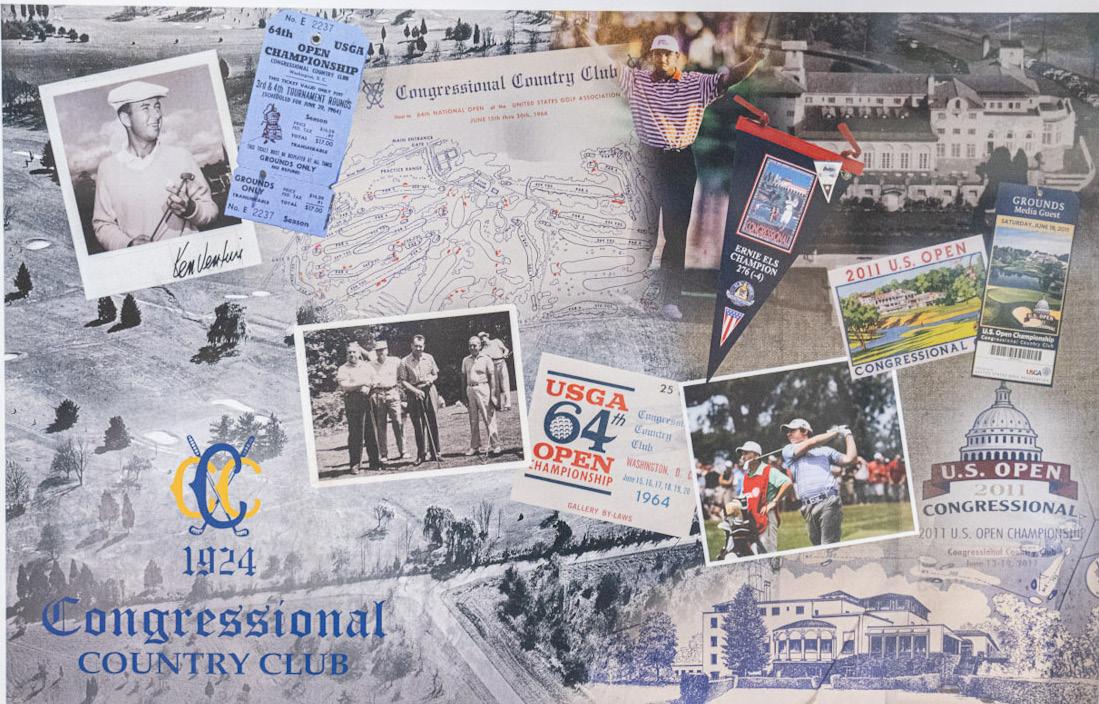

Congressional Centennial



Congratulations to Congressional Country Club!
As we embark on our next century of service to our Membership, the excitement is palpable! With the holiday season fast approaching, there are still countless Centennial activities to enjoy and share with family and friends. These events are not only featured in this month’s communique but can also be found on the Club’s website.
The rich history of Congressional Country Club is timeless—full of tradition and reflecting the very essence of what a family-oriented club is all about. In the coming months, a comprehensive Congressional Country Club History Book will be offered to the membership. This remarkable publication will be filled with history, photos, and stories, some not discovered or ever understood until now. We are confident it will exceed expectations and reflect the proud legacy that Congressional’s membership holds dear.
Our Centennial communications have not only highlighted signature events but also shared the incredible history found in the Club’s archives, as well as at the Library of Congress and the National Archives. Congressional is a storied institution that has been meticulously documented for decades, and we look forward to displaying more of this history prominently within the Club in the future.
Centennial celebrations are often fleeting—lasting just an evening or, at most, a weekend. But at Congressional, we’ve taken a more ambitious approach. After years of thoughtful planning, the Centennial Committee worked tirelessly to ensure that our year long celebration would be an experience for all generations—done with the style and elegance our members expect. With over 3,000 members participating in Centennial events this year, it is a testament to the creativity and dedication of our amazing behind-the-scenes team members. You are truly the heart of the Club. On behalf of the Centennial Committee and the entire membership, we offer our deepest gratitude to everyone who helped plan, prepare delicious culinary offerings, organize competitions, maintain the golf courses, tennis courts, and pools, and bring this special year to life. Your efforts are truly something to be proud of.
Looking back to 1921, when Congressman Oscar E. Bland and O.R. Luhring of Indiana saw the need for a place where Congress could meet socially with industry leaders and dignitaries from around the world, it’s clear that the vision they had for Congressional Country Club was nothing short of extraordinary. When the doors officially opened in May of 1924, with the Marine Corps Band playing and President Coolidge, President Hoover, and Supreme Court Justice Taft in attendance, Congressional was heralded as the most advanced club in the nation. A century later, we can proudly say that their vision has endured, and the stewardship of our membership ensures that Congressional remains at the pinnacle of excellence, ready to create even more unforgettable memories in the years to come.
Wishing you and yours a joyful and blessed Thanksgiving and Holiday Season. Here’s to many more years of tradition, history, and camaraderie at Congressional Country Club!
Sincerely,
Mark Giarraputo
Centennial Committee Chair
The Centennial Committee
Mark L. Giarraputo, AIA., Chair & Past Club President
Timothy Sullivan, Past Club President
Stephen Spencer, Board of Governors
Geoff Tracy, Board of Governors
Tamara Jobe, Past Board of Governors
Lori Zorc
Paul Mavrikes
Jeffrey Kreafle, CEO & General Manager
Rachel Krueger, Director of Catering
Maxine Harvey, Director of Member Services
TABLE OF CONTENTS
LEGACY CENTENNIAL INTERVIEW HALLOWED GROUND: AN ERA TO REMEMBER BACK IN 1924 EVENTS RECAP:
CENTENNIAL WINE DINNER & THE BANQUET: HARVEST DINNER CLUB ARTIFACTS FOUNDING LIFE MEMBER PROFILES CENTENNIALMERCHANDISE COLLECTION
legacy centennial interview

We have interviewed some of Congressional’s Members to highlight their stories and memories at the Club. Please enjoy the next video interview below with Bill Hendricks.




Jazz music was still the dominant genre, and Louis Armstrong moved to New York City, which changed his career.

Mah-Jongg was very popular and people would often decorate their rooms in Chinese style and wear costumes (Popular at the Club again 100 years later!)

Kleenex® Tissue was first introduced and originally marketed as a cold cream remover. A package of 100 sheets sold for 65 cents.

The Summer Olympics took place in Paris from May 4–July 27.

The Statue of Liberty was declared a National Monument on October 15, 1924 by President Calvin Coolidge.



hand-built 1924
The Cross Word Puzzle Book was the first collection of crossword puzzles published in the US.
Babe Ruth was the most famous athlete in the world.
A
model of the Rice-Kellogg dynamic loudspeaker, invented by Chester Rice and Edward Kellogg of the General Electric Research Laboratory.

Embarking on Our Centennial A Year to Remember
100 Years
Centennial Wine Dinner

Saturday,October 26









On Saturday, October 26, a group of Congressional members gathered in the Capitol Dining Room for the Centennial Wine Dinner. An occasion that would represent five years of planning to acquire the eleven fine beverages that would be offered throughout the evening.
Rapsody in Blue by George Gershwin and 2011 J. Lassalle, Cuvée Angeline, Brut Champagne welcomed the celebrating parties into the Dining Room for the opening Act. A historical review with generously aged Vintage Armagnac from 1924, 1964, 1976, 1997, and the afore mentioned Champagne to honor 2011.
Mr. Matthew Brown read the 1924 and 1964 vintages. 1924 welcomed Mr. Brown to the dais playing the iconic ‘Rhapsody in Blue’ as images of our Club's construction and other major current events from that year illuminated the room as Mr. Brown read. After a sip of Armagnac and a bite of Foie Gras on Brioche, Mr. Brown returned to the stage welcomed by the Beatles performance on the Ed Sullivan Show, playing ‘I want to Hold Your Hand’ with imagery from the year 1964 including Ken Venturi's legendary US Open win amidst a record-breaking heat wave and the arrival of Cassius Clay transcending into Mohammed Ali with his surprise victory of Joe Fraiser.
Mr. Ernest Baynard took the reins for 1976 and 1997, greeted for the 1976 reading by the joyous duet of Elton John and Kiki Dee singing ‘Don't Go Breaking My Heart’ and Dave Stockton's PGA Victory at Congressional set the backdrop. Unbeknownst to everyone in attendance, save his loving wife Lindsey, Mr. Baynard held the proverbial Ace of Spades up his sleeve, or quite literally in his velvet smoking jacket's inside breast pocket. A letter, he would reveal, penned by the star of 1997 at Congressional Country Club, US Open winner Mr. Ernie Els. Written the day before this very dinner celebration, Mr. Els honored the Club, the Centennial celebration, the 1997 vintage, and sent his kindest regards through Mr. Baynard's mindfulness to make the evening as special as possible.



October 25, 2024
Congressional Country Club
Dear Members:
It is my pleasure to wish you a hearty congratulations on your 100th year! As you know, Congressional is a very special place for me. I understand that you are going to be drinking exceptional spirits and wine from your cellar tonight each of which marks a milestone year in which a major championship was played on the Blue Course.
As a winemaker myself, I have to say that I think the 1997 vintage is one of the best a great year in every aspect- and just keeps getting better with age.
I look forward to coming back to Congressional and competing to win another major next year when the Senior PGA Championship comes to CCC.
Enjoy your evening and best wishes on your Centennial- here's to another 100 years!
Sincerely,

Els

ERNIE ELS
Ernie

Governor Stephen Spencer took the dais for the final reading, played on by the year's thunderous ballad by Adele, ‘Rolling in The Deep.’ Governor Spencer graciously recounted Rory McIlroy's lightening-strike burst on to the global golf stage at Congressional Country Club when he routed the field in the 2011 US Open. Cheers arose from those in attendance as the headlines from Osama bin Laden's death were recounted, as justice served was embraced. Yes, the Historical reviews included historical events from the Club, the country, pop culture, sports, science, and the world from each vintage as members sank back into their captain's chairs with fine brandy wafting, as they remembered a broad, rich spectrum of our 100 years as Congressional Country Club.
An Intermission was taken. Act II for the evening was an opportunity for a short walk to the Presidents’ Room for an intermission with a Napa Valley Tasting Room spirit. Members were poured the first wine of the evening for dinner. The 1924, Growth from the 2019 vintage 100% Cabernet Sauvignon from equal parts of St. Helena and Rutherford. Wine Director, Jeff Turok would then present the story of the design and acquisition of the 1924 Centennial Series Wines, speaking to the inspirations and technical aspects of all the wines that were soon to be enjoyed with dinner.
Act III, The Dinner. A complete set change. The dramatic unveiling of the Capitol Dining Room greeted members as they returned to begin the grand celebratory feast! The candle lit King's Table dressed with crushed velvet, created a soft mahogony glow that bounced of the piano finish of 1924 Centennial Cases which adorned the Dining Room's hearth under the Oaken American Eagle.




Dinner was indeed served. An Era based menu designed by Chefs Stephen Pungello and Justin Bergo was served with each of the 1924 Centennial Series wines telling the story of Congressional's rich history in four chapters. The Growth, commenorating the arrival of the Championship Era, was served with Chef Paul Bocuse's Truffle Soup En Croute made famous in the 1960's and 70's during the height of the iconic Chef's career. The Preservation, savoring the Post-WWII resiliency of the Club and our nation, expressed with a Victory Garden Salad with preserved egg and bacon vinaigrette. The Heritage, toasting the Centennial Era of the Club, was served with Black Cod Rolade with Fennel and Brown Butter Dashi. For the main course, The Founding, cherishing the Prohibition Era, was served with an artfully laticed Beef Wellington with Sauce Chasseur and tournée vegetables. The Contempory Era of 2011 was Chef May Hamoda's Black Forest Mousse Cake served with Churchill's 2011 Vintage Port.
Who doesn't like a raffle? A post dinner drawing earned the room's favor in order to sort the individually numbered Centennial Cases. Mr. Brown was drawn first and chose Centennial Case 1 of 100, Mrs. Riley was drawn next and claimed 100 of 100, and we were pleased to draw Mrs. Rao next to gift her with the Baccarat Crytal Caraffee the 1924 Vintage Armagnac was served from.







The Banquet Centennial Harvest Dinner


The rain cleared just in time to savor an enchanting evening under the open sky at The Banquet: Congressional’s Centennial Harvest Dinner on September 26.
This special event was elevated by the presence of our valued members and guests, whose camaraderie and warmth set a welcoming tone for the evening. The true magic of the night unfolded through the smiles, laughter, and heartfelt conversations that flowed from one end of the table to the other.











club artifacts
Whatever entrance you use to access the Club, you are instantly taken back in time and surrounded by unique historic artifacts. These are precious reminders of our storied past and give us insight into their connection and significance to Congressional.




Jonathan Ogden Armour
American Business Magnate

Jonathan Ogden Armour (1863–1927) was an American business magnate, best known for his leadership of Armour & Company, one of the leading meatpacking firms in the United States during the late 19th and early 20th centuries. Under his guidance, the company expanded its reach and influence, playing a pivotal role in the American meat industry and helping shape the landscape of U.S. business during that era.
Born in Milwaukee, Wisconsin, J. Ogden Armour was primed for the business world from a young age, as his father, Philip Danforth Armour, had founded Armour & Company in 1867. After completing his education at Yale University, J. Ogden joined the family enterprise, quickly ascending the ranks and taking the reins after his father’s death in 1901. As president, he expanded the company’s operations, introducing innovative techniques and streamlining production processes. Under his leadership, Armour & Company became synonymous with meatpacking, and its products found their way into households across the nation.
However, Armour’s tenure was not without challenges. The early 20th century was a period of increased scrutiny for the meatpacking industry, especially after the publication of Upton Sinclair’s “The Jungle,” which painted a grim picture of the industry’s working conditions. Armour & Company, along with other major meatpackers, faced regulatory challenges and public relations battles. Despite these challenges, J. Ogden Armour’s vision and leadership ensured that the company remained a dominant force in the industry. His impact on the American business landscape, both in terms of industrial growth and the challenges of corporate responsibility, remains significant.
Edith Rockefeller McCormick
American Socialite & Philanthropist

Edith Rockefeller McCormick (1872–1932) was a prominent American socialite and philanthropist, notable not only for her family connections but also for her own contributions to society. Her life was marked by both immense privilege and personal struggles. Her contributions to the arts and the city of Chicago, combined with her unique personal journey, make her a notable figure in early 20th-century American history.
Born in 1872, Edith Rockefeller was the fourth daughter of the renowned businessman and philanthropist John D. Rockefeller, the founder of Standard Oil, and Laura Celestia Spelman Rockefeller. Growing up in one of America’s wealthiest families, Edith was exposed to the world of business, philanthropy, and high society from a young age.
In 1895, Edith married Harold Fowler McCormick, an executive at the International Harvester Company, which was a leading manufacturer of agricultural equipment. Together, the couple had five children. Their marriage was an amalgamation of two of the most powerful families in America: the Rockefellers and the McCormicks. However, despite their social standing and wealth, their marital life wasn’t always smooth. The couple eventually separated in 1921 and divorced in 1923.
Edith had diverse interests ranging from arts and culture to psychology. She was deeply fascinated by psychoanalysis and even became a patient of Carl Jung in Switzerland. Her engagement with psychoanalytic theories influenced many of her later philanthropic ventures.
She was a key benefactor in the establishment of the Chicago Opera Association in 1910, hoping to cultivate an appreciation for the arts in the United States. She generously funded the association until her financial situation became strained in the late 1920s.
In addition, McCormick made substantial donations towards the creation of Brookfield Zoo, ensuring that Chicago had a world-class zoological park.
Edith faced financial difficulties in the late 1920s and early 1930s due to various failed investments and the Great Depression. She passed away in 1932, leaving behind a legacy that encompassed both her philanthropic endeavors and her personal journey.


visit the golf shop to explore our exclusive centennial-branded merchandise collection.
celebrate congressional’s 100-year legacy with a range of items, including glassware, artwork, accessories, premium apparel, and our signature private label, the centennial collection.


